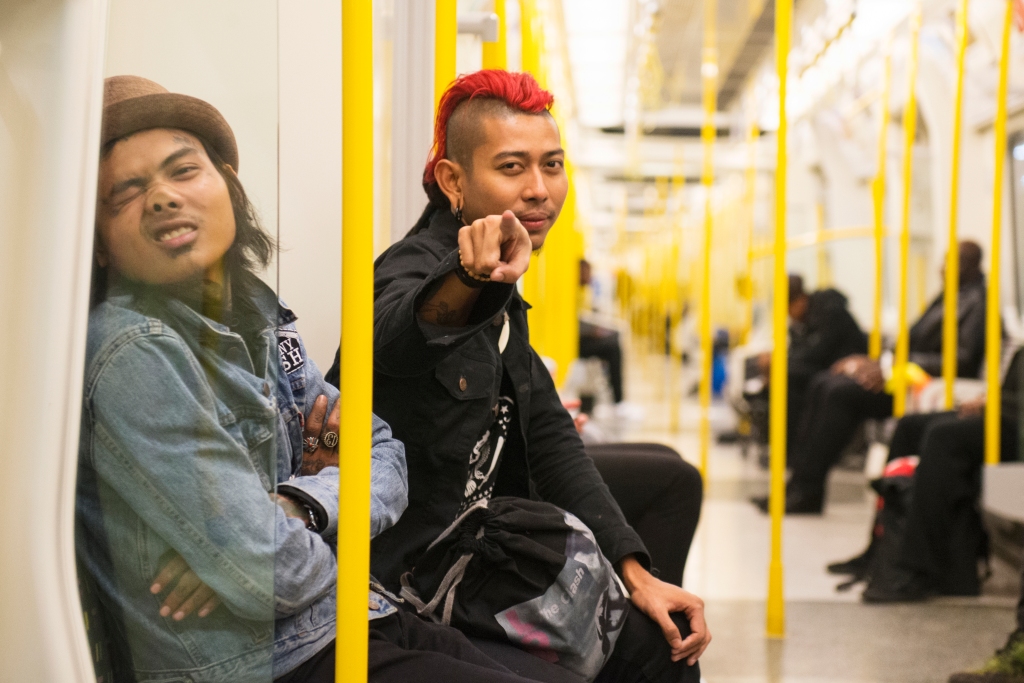
By David Pratt
When most people think of punk, they tend to think of Britain, but international punk solidarity has been an important part of the punk movement since its inception, including in Myanmar (formally Burma) where local and English punks work together to tackle homelessness.
Although originally a British cultural export, punk music has exerted worldwide influence, with vibrant punk scenes popping up around the globe, from South Africa to Chile, and Brazil to Indonesia. With many of these countries facing state oppression from right-wing governments, it is easy to see how punk music, with its left-wing associations and political ethos of unity, anti-capitalism, and anti-fascism, is appealing to people living in repressive conditions.
Myanmar is one such country, whose punk scene is heavily involved in supporting the local homeless and people living in poverty. I spoke to Jay Kerr, a campaigner from Punk Ethics, a group dedicated to promoting the progressive side of the worldwide punk scene. He has been working with Burmese punk band Rebel Riot and other punks in their country to help with their work feeding the local homeless and supporting the less fortunate in their city.

“I have a background in workers’ rights campaigning and often mixed that with my love of punk by organising benefit gigs”, says Jay as we sit for a pint in south London’s beloved Birds Nest. “In 2011, I got the chance to move to Thailand and work in Chiang Mai in the north of the country, near the border of Burma. I worked with a small NGO, MAP Foundation, that supports migrants who crossed the border from Burma into Thailand. They deal with workers’ rights issues, as many of the millions of migrants that have crossed into Thailand end up working in sweatshops in that border region” he explains, sipping his beer.
At the time, Burma was only just starting to open up to the wider world after 60 years of a brutal dictatorship and isolationist policy. By 2014, things had changed and the pro-democracy leader, Aung San Suu Kyi, was encouraging foreigners to visit. So, Jay decided to cross over and see what Burma was like.
It is common for punks travelling abroad to seek out other punks in the places they visit to find out about the local scene. There is something unique about punk in that it creates a real bond between strangers around the world. “When I arrived in Yangon, I looked up local bands and emailed one called The Rebel Riot. The guys from the Rebel Riot community met up with me and my other half and took us out to a Burmese tea shop and then on to a bar, and told us about life as punks in Burma”.
This solidarity between punks is something that’s a huge part of the scene. There is a unity between punks worldwide as most punks share similar left wing beliefs and see punk as a progressive movement as a well as a music scene. Raising money for important causes and helping people around us who are less fortunate is an integral part of the ethos of punk, and is what fuels this international punk solidarity that lead Jay and Punk Ethics to work with Rebel Riot.

Given the poverty rates in Myanmar, it is obvious why Jay wanted to help Rebel Riot with their activism. According to Unicef, in Myanmar “55 per cent of children live in income poverty, and 25 per cent of children are living in households that do not have adequate toilet facilities’, and according to The World Food Program, around 298,700 people in Myanmar don’t have access to safe, sufficient, and nutritious food, and are in need of assistance. Looking at these statistics, it is clear why the Burmese punks decided to start their ‘Food not Bombs’ program.
“They told us all about their work setting up a Food not Bombs chapter in their city, Yangon, and feeding the many homeless people that you see on the streets. They believe passionately in solidarity and felt that providing a meal and friendship to strangers was a revolutionary act. The fact that the punk scene in Burma is very much one of mohawks, leather and studs, means their solidarity work on the streets creates a unique and eye-catching image”, says Jay.
“The Rebel Riot go out once a week with food they have bought from local traders to feed the homeless. Street kids will often descend on the corner where they set up and tuck into the free meal. They will then sit around and play music with them, getting the kids to sing and dance as a positive respite from the harsh world on the streets. They will take any left-over food and walk around the city looking for homeless people to give it to. They never have to walk too far”.
In a 2019 interview with Aljazeera, Rebel Riot’s singer Kyaw Kyaw further discussed the ‘Food Not Bombs’ work they have done in their city.
“We work on a lot of projects but they are all about humanity, sharing love, kindness and supporting each other. One project is called ‘Food Not Bombs’. Every Monday night we give food to homeless people. Another project is called ‘Books Not Bombs’. We are going to schools outside of Yangon to teach the kids positive ideas about love, kindness and compassion. We support the kids with music, reading and cooking together. Another project is called ‘Free Mobile Shop’. Everybody has a lot of stuff in their home they don’t really use. So why keep it at home when you can share it with someone who really needs it?’ ‘I can’t change the world. I can’t even change my country. But I can change two things: myself and around me.”

Clearly the work Rebel Riot do in their city of Yangon had an impact on Jay, and the ethos in punk based around mutual aid and solidarity led him to want to help them out.
“Meeting the Burmese punks left a deep impact on me, and as I was returning to London I said to the singer of The Rebel Riot, Kyaw Kyaw, that I wanted to organise a benefit concert to help them build their punk scene. In a country with widespread poverty and a highly conservative culture, developing a scene and finding places to play is no small task. So I said, ‘If you could have any band in the UK play a benefit gig for you who would it be? To my surprise and relief, he said The Restarts, a legendary, London-based DIY punk band that I knew would be happy to help out.”
Punk Ethics did lots of different work to raise money and support the Burmese punks and help them develop their punk scene. “We started selling a book that a German filmmaker and photographer, Alexander Dluzak, had made called Yangon Calling, sending out the profits to Burma. We screened a film of the same name to raise awareness, and also organised a few benefit gigs.”
The benefit gigs were very successful, and helped raise money which Punk Ethics could send out to the Burmese punks. “We did a benefit gig for the Rebel Riot, where The Restarts played and we made a short film about the gig that the punks in Burma could watch and hopefully be inspired by. We raised over £600 to send out to the Burmese punk scene, which at that time was about an average years’ wage. They spent the money on a new computer and a video camera for the scene to use to make zines and record their gigs.”

When Jay returned to Burma to give Rebel Riot and the Burmese punks the money he had raised for them whilst in England, there was one more thing that Jay wanted to do, and that was bring the Rebel Riot to England.
“I returned to Burma to bring them the proceeds from the benefit gigs, and on returning home I made them another promise, that I was going to try and bring them to the UK to play. After a crowd funder that raised £5000, plus support from our Burmese activist friends in the UK and some unlikely support from politicians in securing the visas, we finally managed to bring The Rebel Riot over to the UK for what was a historic tour – the first ever UK tour of a Burmese band, let alone a Burmese punk band. It was quite an emotional experience for everyone involved.”
“When we finally got them to the United Kingdom, Aidan McManus who runs the Soho Punk Walking Tour showed Rebel Riot around iconic places of punk history in London that they had only ever read about and dreamed of visiting. The owner of The 100 Club opened his doors to them for a private backstage tour and they added their band name to the famous wall alongside the stars that have played there. They played to packed out shows across the country and ran Q&As at a screening of a film that had been made about their punk life in Burma called My Buddha is Punk, introducing punks around the country to their world. We arranged tour T-shirts through No Sweat that completely sold out and, along with other merch sales, we sent them home with over a grand to help develop their solidarity projects and their punk scene.”

Rent or buy My Buddha is Punk here.
What Jay and Punk Ethics achieved for the Rebel Riot is something to be proud of, and is a true testament to the progressive nature of the punk scene,. The punk scene in the 21st century has a heavy emphasis on activism and helping out each other for the greater good. Through international punk solidarity, Jay and his campaign group Punk Ethics managed to raise money to help Rebel Riot, and managed to bring them to London to have a tour of their dreams, one that will go down in London DIY punk history, and none of this would have been possible without the heavy emphasis on solidarity in the punk scene.
As Jay finishes his pint, just before he gets ready to leave he explains to me how and why international punk solidarity is so important.
“International solidarity is important in general as it links people that are often struggling under similar conditions, enabling them to learn from each other and help each other. A message The Rebel Riot brought to the UK was one of DIT – Do It Together, that they spoke about on stage at every gig they played. International punk solidarity is especially important as punk was born out of a rejection of the status quo, a rejection of the conservatism in society that stifles individual expression. Punks around the world seek each other out, to meet up for a drink or go to a gig. Wherever punks go they look for the local scene. In some countries it is more dangerous to be a punk than others. In many western countries punk has entered into the common culture and is often accepted and ignored, but in places like Burma and Indonesia punks still face very real discrimination and harassment, particularly from the police. So international punk solidarity is vital.”

